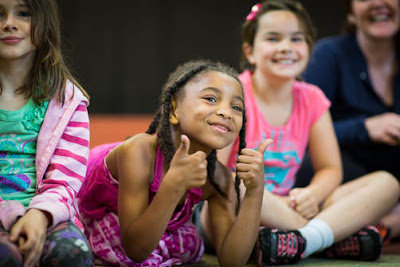There's an emerging trend in afterschool to focus on the needs of boys,
 |
| Ashanti Branch |
Q: Do you think it's helpful to develop programs that are gender based?
A: There is a huge need to have separate gender groups for the work that the young men need to do by themselves; for the work that young women need to do by themselves. There needs to be safe space for them to come together and learn about healthy relationships, healthy conversations, and building community together.
What I realized was that our young men need a space where they can be not only held to high expectations, they can be given high support; that this is an environment where, as a mentor, I can push them the way that I need to push them and they do not worry about how it looks to other people in the room.
If young men are not learning how to be young men in a healthy way, then how will they learn how to be young men in a group with young women? They need to figure out, "How do I be? How do I work in this world?" The world is expecting you to act a certain way. We don't put them in a box. We say, however you show up and however you are, you're perfect. But how do we help you learn tools? To navigate and communicate in ways that are different - not just based on who we are and how we are raised. I think it's really important.
As a teacher, I've seen students who are smart, who do their homework on the sly, then they goof off and talk back. Then you recognize it - they're trying to code switch. Many boys think they can't let their friends know that they are a freaking 4.0 student. I had one youth who dressed in clothes four times bigger than his body. For four years of high school, he was valedictorian. But he knew that what he had to do and luckily he had it in him - "I'm going to take care of my business while I still fit and feel cool with my homies". Most don't have tools like that.
 |
| Source: Ever Forward Club |
Q: Can you say something about afterschool and school-day environments?
A: Afterschool programs allow young people to say, "Look, the day is over. I'm tired of pretending that I like whatever they were talking about. Now I get a space to just be free." In afterschool, we have the space to help our young men know that they are valuable. "You may not do so good in your bookwork, but you've got a lot of skills.” I think that afterschool programs allow youth to get a taste for something else, to see how good they can be at something that's not going to be marked as a grade, or not going to take their creativity and crush it because somebody told you that your drawing “is not according to the rubric”.
Many of our schools today are not engaging, exciting or fun. Unfortunately, school still looks like it did 100 years ago. I think schools are maybe one of the only industries that are operating as it did 100 years ago and still expect to be successful. We have a system where you show up, you sit down, you listen, you do what the teacher says, and you go home and hopefully you can regurgitate it when they give you a test.
How do we make sure that not only the afterschool people know how to support young people, but we also take those skills and help teachers integrate those into their classroom? I think it's important that both happen. I believe that it should happen all day long. Teachers should be educated in how boys learn differently than girls in a safe way so that teachers can make sure that they're providing the type of education that's going to reach all of their students. That's what we're trying to do in Ever Forward. We're trying to do more work around the social-emotional development of our young men, teaching them to be social-emotional leaders, so that it doesn't just happen afterschool. It happens all day long. That's what we're really excited about.
-------------
Mr. Branch, born and raised by a single mother on welfare in Oakland, California, took the road less traveled to get out of the ghetto and attended one of California’s premier engineering colleges, California Polytechnic - San Luis Obispo. After tutoring struggling students, he realized his true passion was teaching. In 2004 as a first year teacher, Ashanti started The Ever Forward Club to provide a support group for African American and Latino males, who were not achieving to the level of their potential. Since then, The Ever Forward Club has grown to serve both young men and women and become a 501(c)3 non-profit organization.
Ashanti was awarded with a Fulbright Exchange Fellowship to India, a Rotary Club Cultural Ambassadorial Fellowship to Mexico and a 2010 Teacher of the Year Award from the Alameda-Contra Costa County Math Educators. Mr. Branch is on a mission to change the way that students interact with their education and the way schools interact with students.








